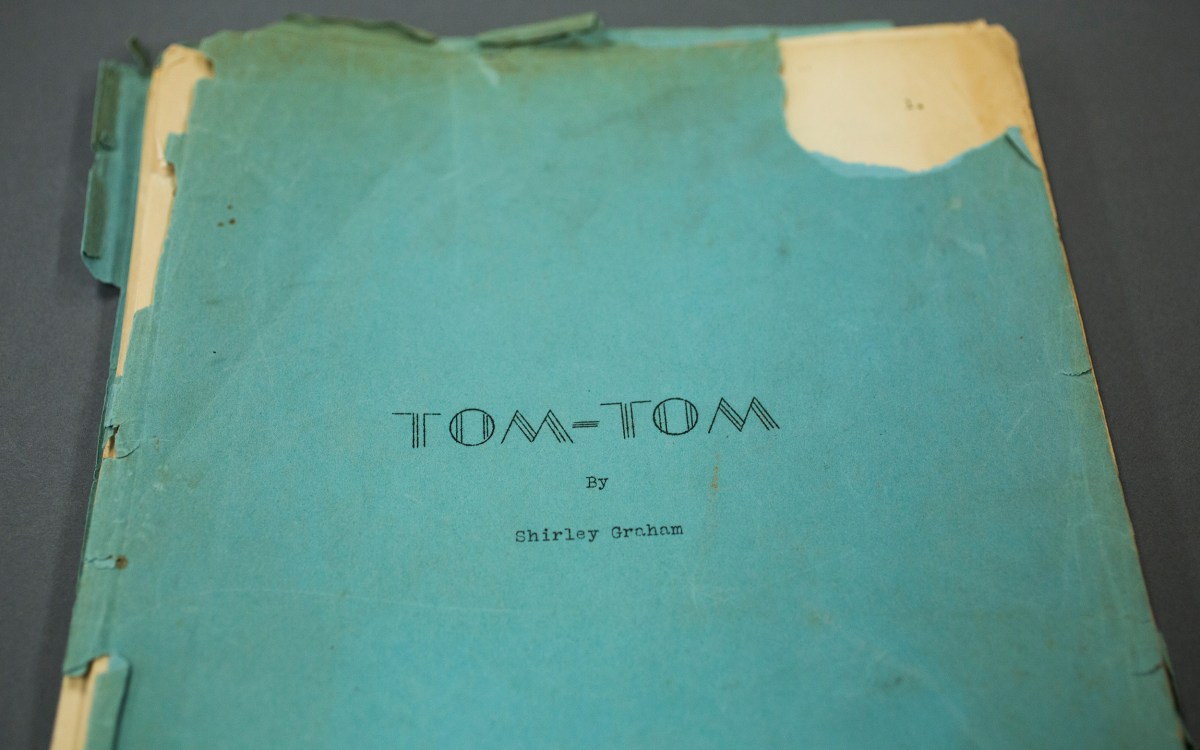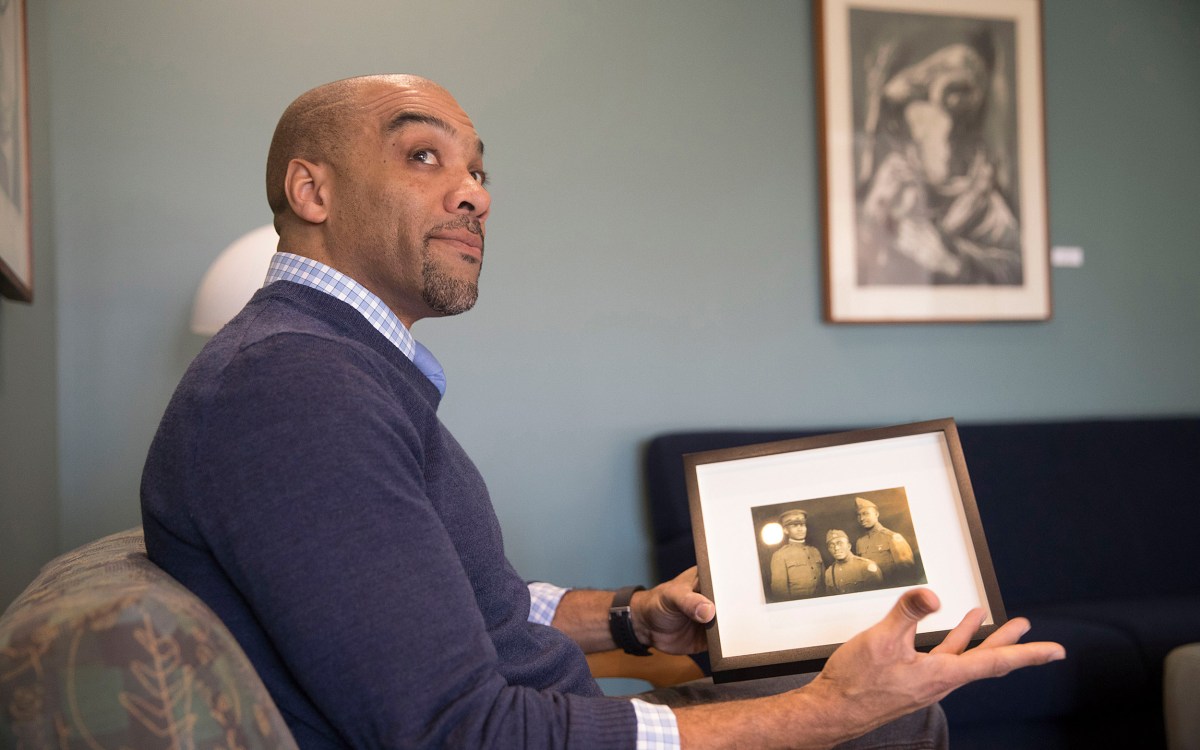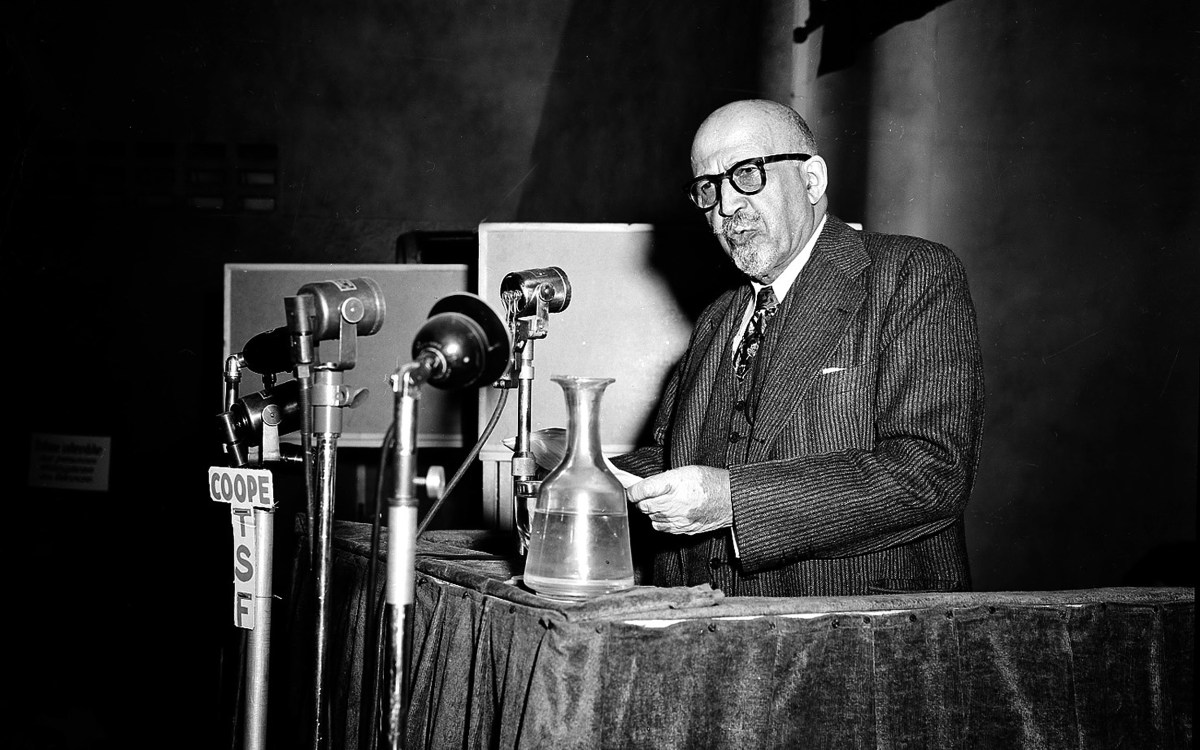Giving Du Bois his due
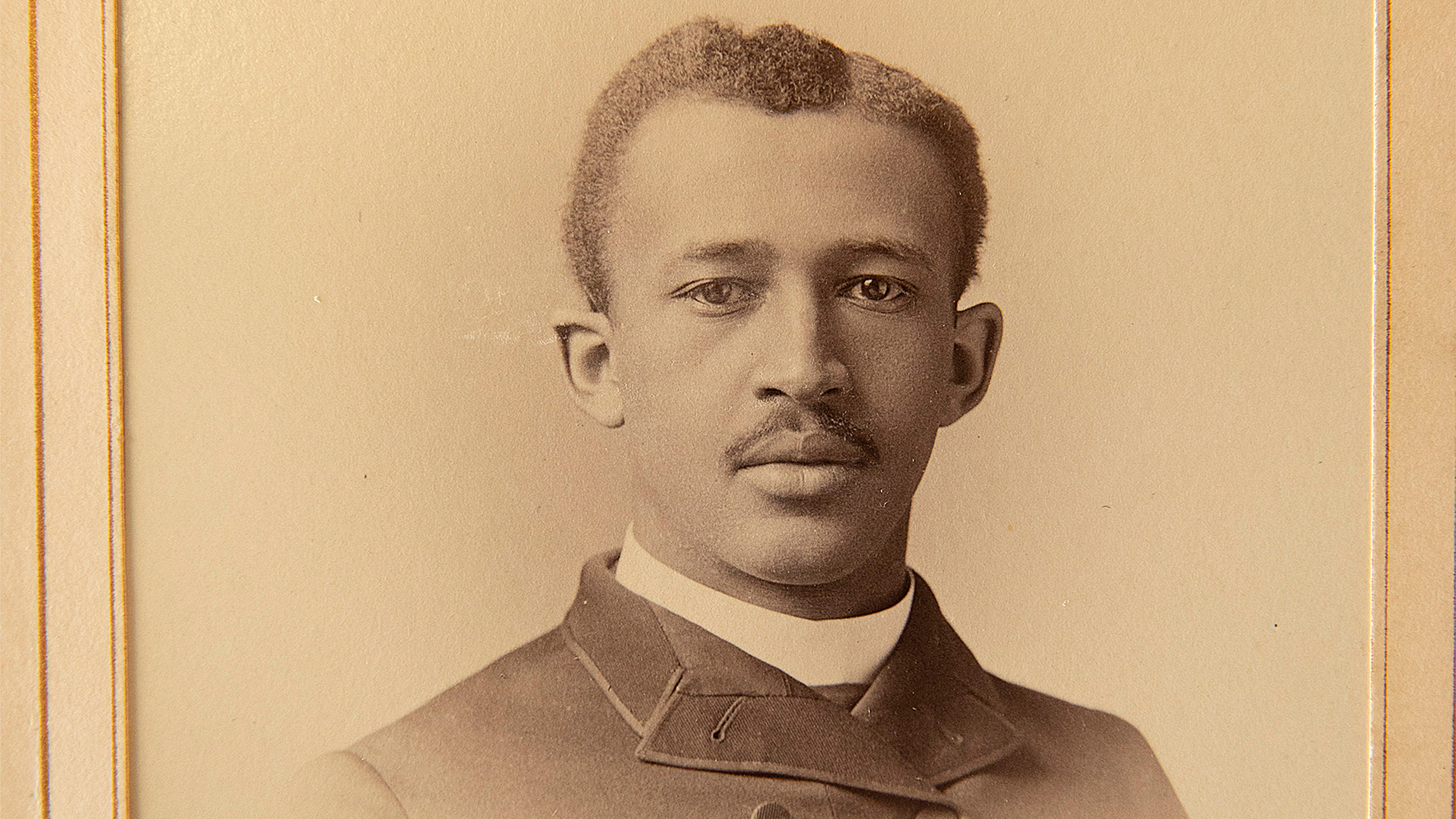
Graduation portrait of W.E.B. Du Bois, a member of Harvard College Class of 1890.
Photos by Kris Snibbe/Harvard Staff Photographer; courtesy Harvard University Archives
Sociology conference to reconsider contributions by African-American scholar, leader
Although best known for his landmark 1903 book “The Souls of Black Folk,” W.E.B. Du Bois was far more than an eloquent essayist and chronicler of African-American life.
Born in 1868 in Western Massachusetts, Du Bois lived through a remarkable sweep of African-American history, from five years after the Emancipation Proclamation declared slavery ended to the eve of the March on Washington.
A revolutionary thinker far ahead of his time, Du Bois blazed trails as a civil rights activist, visionary scholar, scientist, historian, educator, editor, and outspoken public intellectual. His pioneering research and theories, his prolific writing about black and white social dynamics and racial identity, his deep understanding of U.S. history, global politics, and political movements, along with public education, art, and literature, make Du Bois one of America’s intellectual giants.
His ties to Harvard are deep and complicated. Lacking the means to afford Harvard College, Du Bois went to all-black Fisk University in Tennessee. After graduating, he entered Harvard in 1888 and earned a second bachelor’s degree (cum laude) in 1890. In 1891, he completed a master’s degree at Harvard, and headed to the University of Berlin before returning to Cambridge to pursue a Ph.D. in history. In 1895, he became the first African-American to earn a doctorate at Harvard. “The honor, I assure you, was Harvard’s,” Du Bois reportedly once said.
To honor the 150th anniversary of his birth, the Harvard Department of Sociology is hosting a major four-day symposium that begins Thursday, featuring scholars from Harvard and across the country and designed to reconsider his intellectual legacy and his standing in the canon. Though Du Bois conducted some of his most groundbreaking scientific research in the 1890s when sociology was still in its infancy, the field has been far slower than the humanities to recognize his contributions.
Lawrence Bobo, W.E.B. Du Bois Professor of the Social Sciences and new dean of social science in the Faculty of Arts and Sciences, spoke with the Gazette about Du Bois’ place in the history of sociology and about how many of his insights about African-Americans and the larger culture remain spot-on today.
DuBois’ application to Harvard College. He had hoped to attend Harvard College right out of high school in Great Barrington, Mass., but did not have the means, so he applied in 1888, earning an A.B. in 1890.
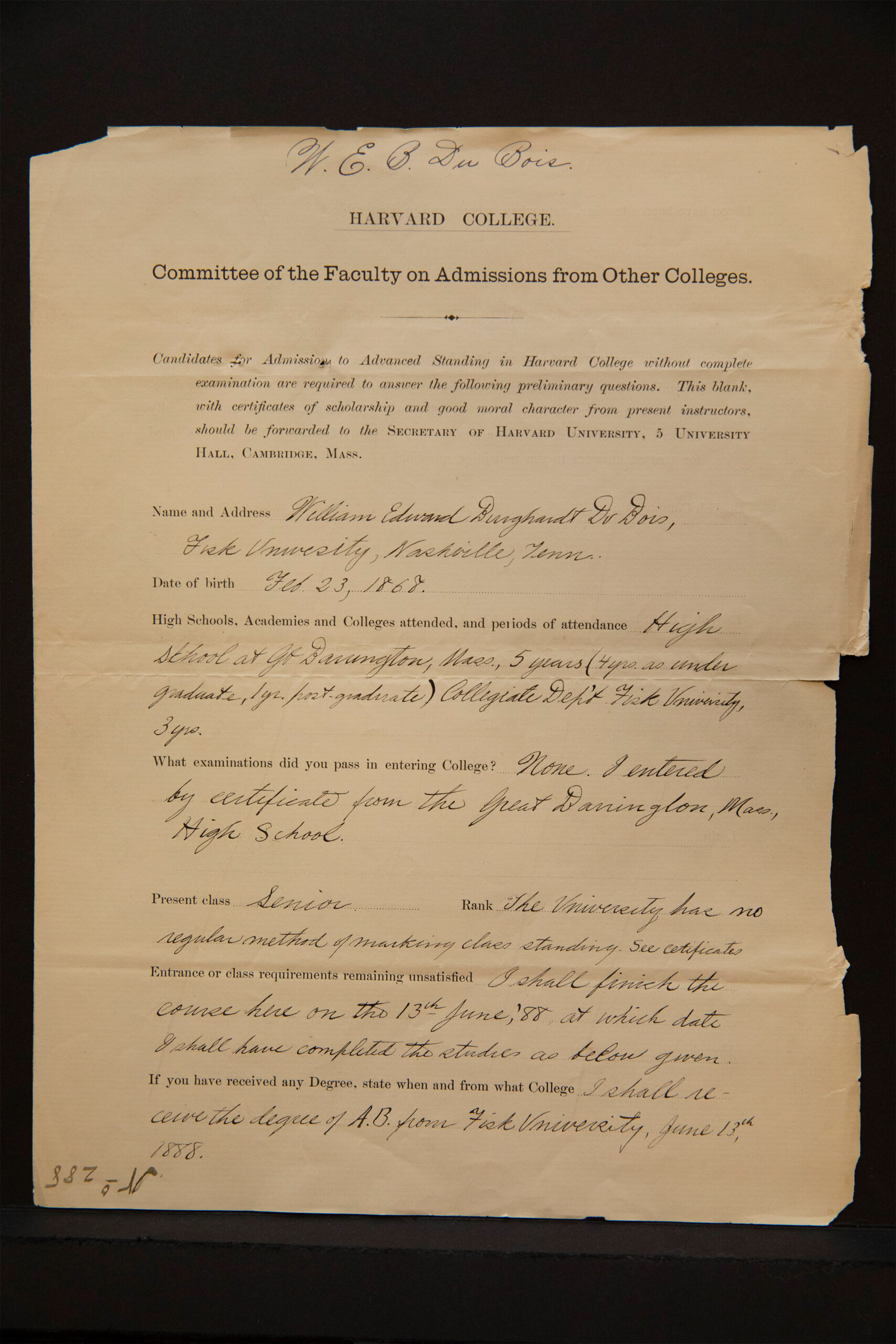
Q&A
Lawrence Bobo
GAZETTE: How important was Du Bois’ research in his study “The Philadelphia Negro,” and how is he viewed today in the field of sociology. Has he finally gotten his due?
BOBO: In a way, Du Bois still hasn’t gotten his due. Aldon Morris’ book “A Scholar Denied” has done a lot to inspire and push along a re-examination of Du Bois and a re-examination of the development of sociology in particular and the social sciences more generally, with respect to an eminent African-American scholar who did pioneering work. If we were to go back to 1899, he publishes “The Philadelphia Negro,” which was an innovative, cutting-edge piece of work in the fullest sense. This is within a couple years of Émile Durkheim’s publication on suicide, within a couple years of the establishment of the first sociology department in the U.S. — 1892, at the University of Chicago.
This is a figure who should have been lionized and right at the core of the discipline. To a small degree, he was recognized in that time. “The Philadelphia Negro” did manage to get a number of positive reviews in many prominent outlets, though ironically the American Journal of Sociology at the University of Chicago was not one of them — but many other outlets responded. And like most of the folks who aspired to become leading academics in sociology in that era, he’d gone to Germany, he’d done a period studying with economic historians of that era. He had that pedigree. He rigorously applied every tool imaginable to making the “The Philadelphia Negro” a real tour de force in its era. And, as a byproduct of the Jim Crow system and white supremacist racial ideology at the time, it was compartmentalized away from what was thought of as influential, important scholarship even though, to a degree, it was recognized as a remarkably well-done piece of work.
Du Bois’ undergraduate transcript. After earning a bachelor’s degree at Fisk University, the historically black university in Nashville, Tenn., he arrived at Harvard College as a junior.
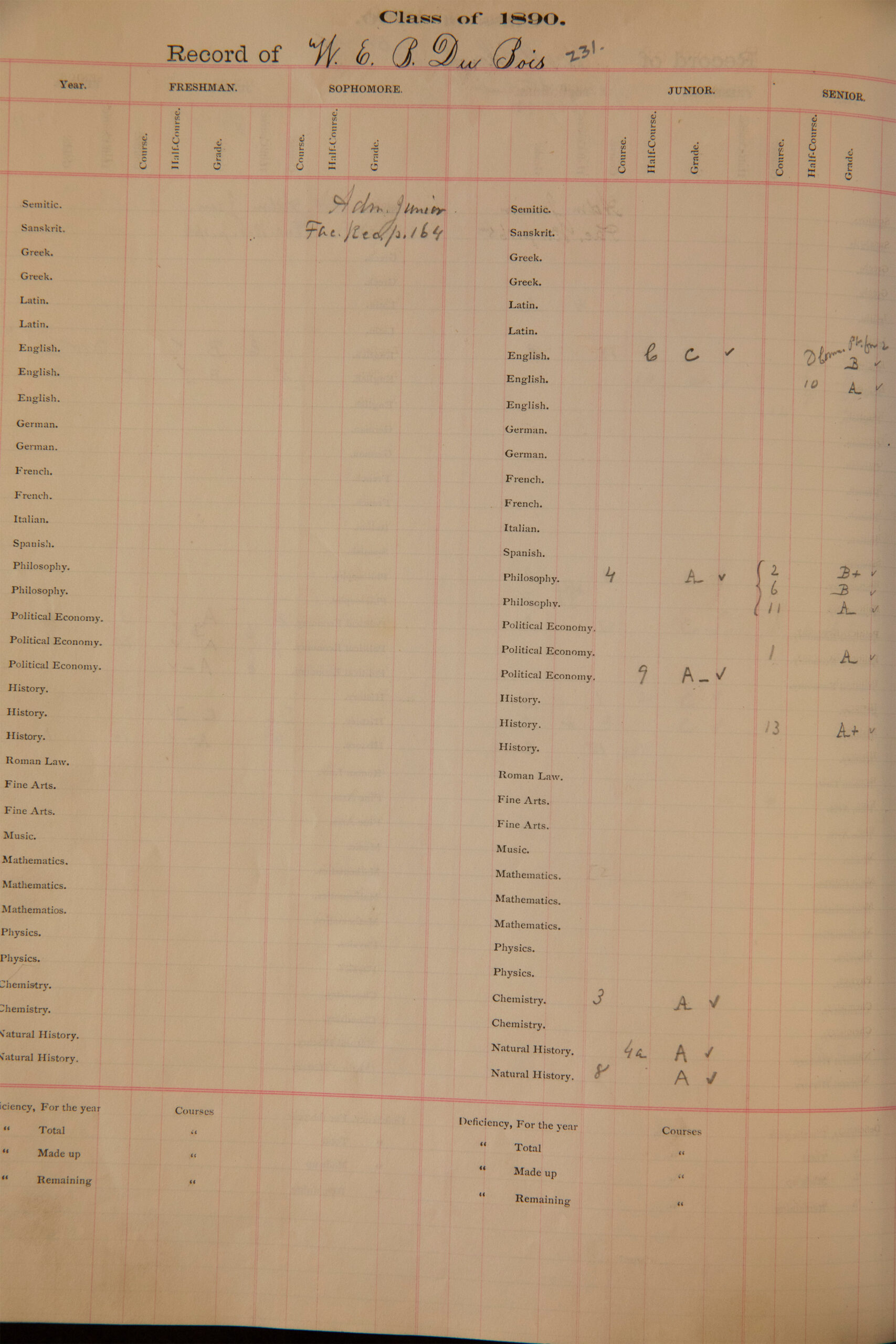
GAZETTE: Was he marginalized professionally because he taught at Atlanta University, a historically black institution?
BOBO: I think that was a piece of it: that he himself was not white, that he himself had no real access to placement in a permanent position at a major university. Even the University of Pennsylvania, where he was doing the research for “The Philadelphia Negro,” only ever hired him as a research assistant. He didn’t have a real faculty position. About a decade ago, they awarded him, posthumously, an emeritus professorial title.
So he can’t get into a mainstream institution, and his work focuses on black people. And so it was easy to say, “He’s not important; the subject matter can’t possibly be at the core of what we’re about because it’s about black people.” They just did not have to pay attention to it, so it’s in effect not taken seriously.
GAZETTE: Has Morris’s book widely shifted consensus?
BOBO: I personally regard it as a huge intellectual intervention, and it’s inspiring a lot of ferment in the discipline. Many people are responding to the gauntlet he’s cast down before us to begin thinking seriously about how a scholar like Du Bois and others of his ilk should be written more expressly into how we understand the core intellectual wellsprings of sociology in general, but especially of American sociology. This conference is in part one other gesture in that direction, to say “Look, this really is about now recognizing this perspective that should have been a more organic piece of how sociology was done for a century.”
Du Bois’ doctoral dissertation, “The Suppression of the African Slave Trade in the United States of America, 1638-1871,” completed in 1895, 30 years after the end of the Civil War. Du Bois was the first African-American to receive a master’s degree and Ph.D. from Harvard.
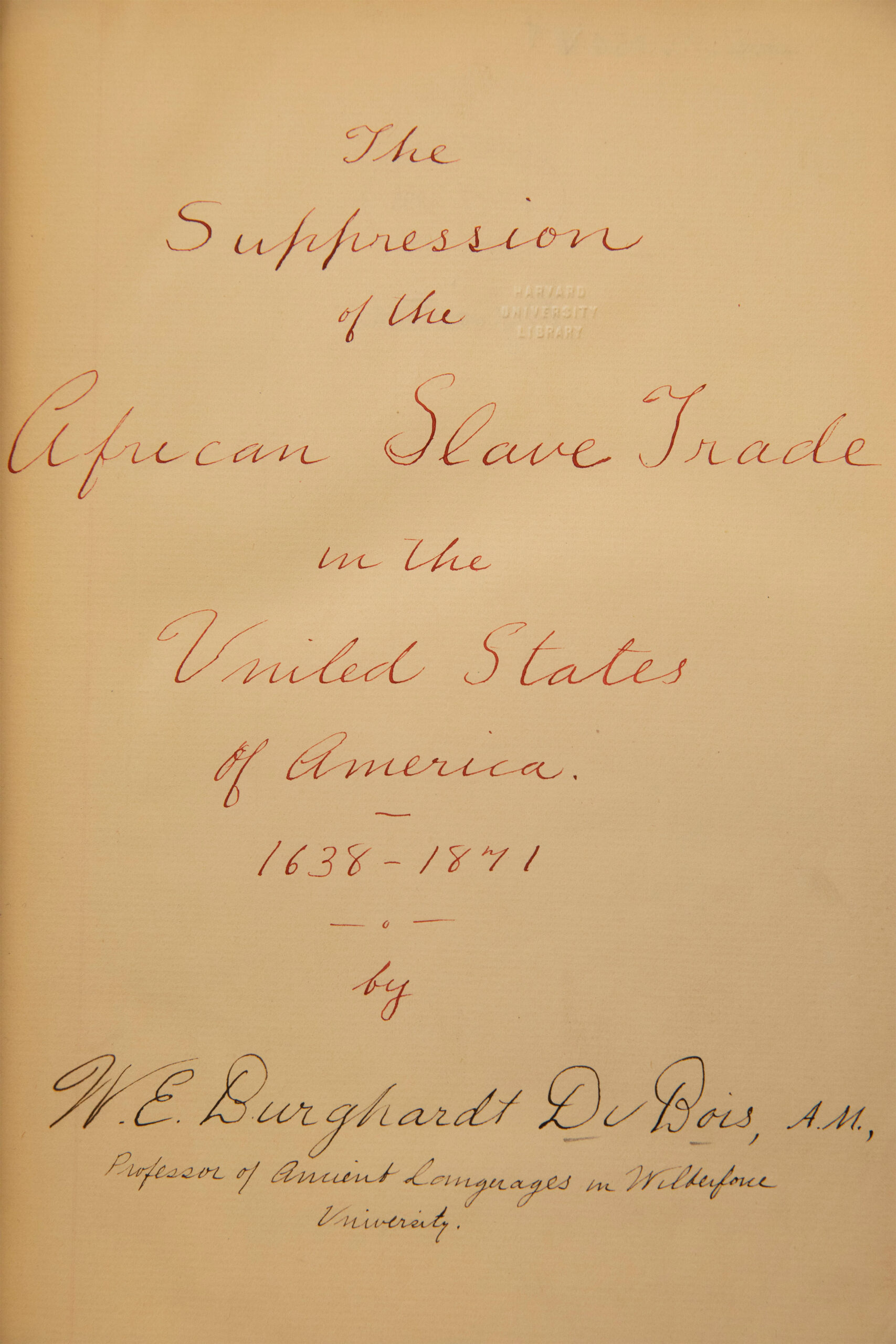
GAZETTE: Du Bois famously declared at the First Pan African Conference in 1900, “The problem of the 20th century is the problem of the color line.” What would Du Bois have to say about where things stand today in America?
BOBO: On the one hand, I think he would marvel at the degree to which what he called “the talented tenth” has moved into mainstream corridors of power and privilege, and, arguably, comfort and influence. But I think he would bemoan, and even rightly claim that he could have forecast or at least laid the foundations for understanding, that we weren’t really ever wrestling with that intersection of economic poverty and race that put African-Americans at this unusually vulnerable place in the social order.
In 1899, Du Bois created a complicated class-structure view of black America, and he was one of the first to emphasize that there was class diversity within the black community. This was class in at least three senses: the material earnings people had, the type of work they performed, and then some more ineffable sense of status within the group.
One of the things he pointed to and emphasized was an element of the group he called “the submerged tenth” who were at the very bottom of the economic order. I think he would be alarmed by the persistence of that problem. He flagged the issue of crime and of disproportionate arrests and incarcerations, though we are at far greater levels of that problem than what he observed in his time. Likewise, he pointed to challenges faced by the African-American family and in maintaining the prevailing household structure. He drew attention to all of those things, and they’re all still with us.
GAZETTE: In his landmark “Black Reconstruction in America: An Essay Toward a History of the Part Which Black Folk Played in the Attempt to Reconstruct Democracy in America, 1860–1880,” Du Bois argued against the prevailing view of Reconstruction as a failure and said that, through a massive campaign of violence and propaganda, the American working class was deliberately cleaved into politically useful factions that pitted white laborers against African-American ones, to the benefit of land owners and business owners. It’s a strategy that thrives to this day. How important was this work in revising how historians now see and understand the era of Reconstruction?
BOBO: I think it’s another one of those things that’s only now really being taken up in mainstream intellectual circles, and even there it’s contested, to some degree, on both the left and the right. You see, unfortunately, in the Trumpian rhetoric of our era, that it’s being played upon for political purposes in the current moment. On the left, we still have this struggle between whether we should all be pursuing an economic agenda or giving in to “identity politics.” The Du Boisean point of view, sadly, gets identified with identity politics. I think African-Americans in general — certainly my own perspective — are wide open for a very general economic agenda as long as one expressly recognizes that we’ve created an economic order that racializes the very bottom, and that’s a distinctive element that has to be engaged in those terms if we’re serious about achieving a more just and equal social order. You can’t just pretend it’s not there, because it is.
One exciting intellectual current is thinking and writing around racial capitalism, the part that race and racism have played in facilitating capitalist expansion, and colonization and imperialism as a mode of engaging global economic production, and why it’s easy to expropriate from those you’ve defined as lesser and who need not be included in a full share of the value of what gets generated from either their natural resources and their lands or their labor, wherever it might exist.
With “Black Reconstruction,” he didn’t change the narrative. He tried to, but the narrative that won was the narrative produced by the Daughters of the Confederacy, this sense that the Civil War was not about slavery and black people’s place in America, but it was a war about brothers and state against state and that now we needed redemption and reconciliation.
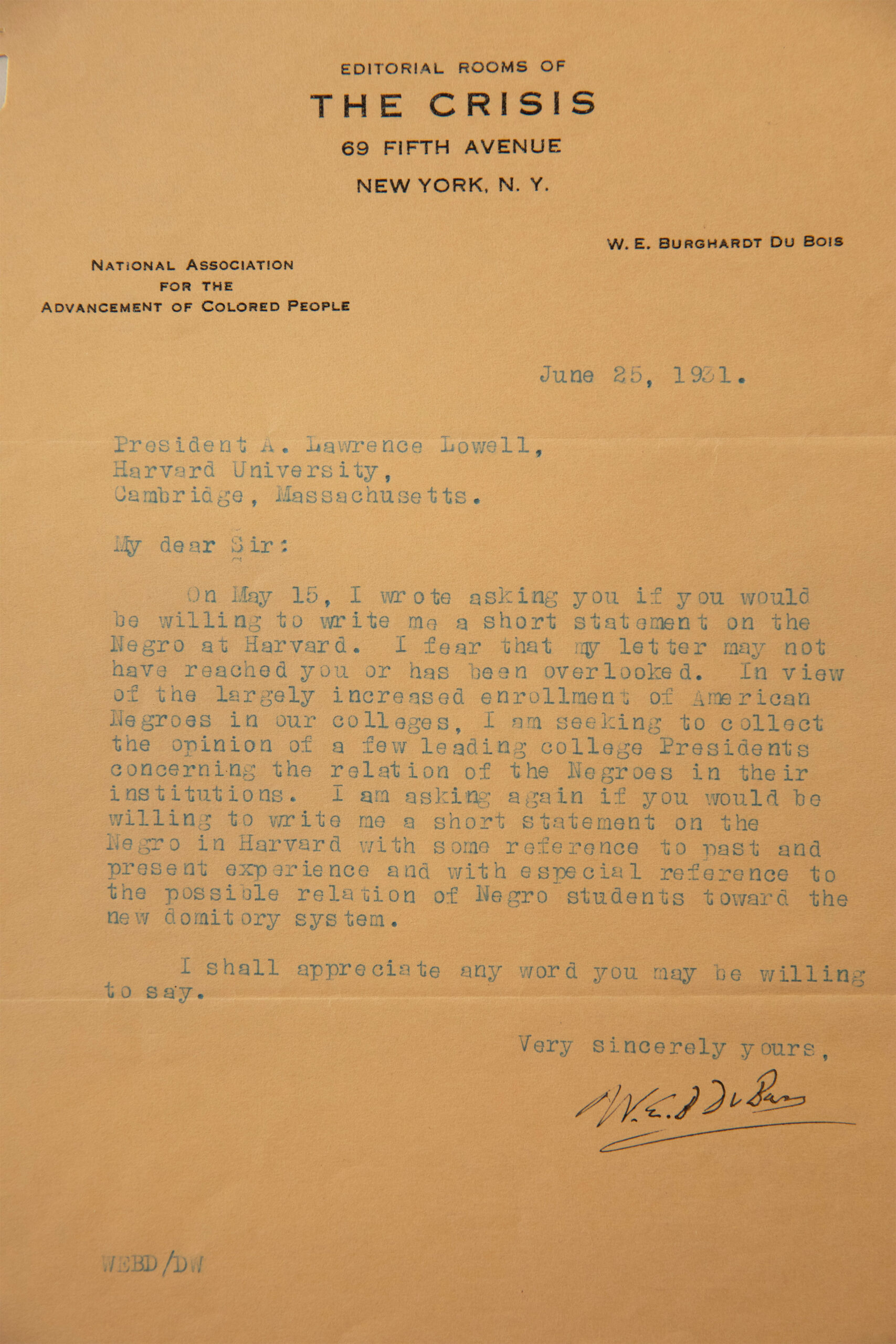
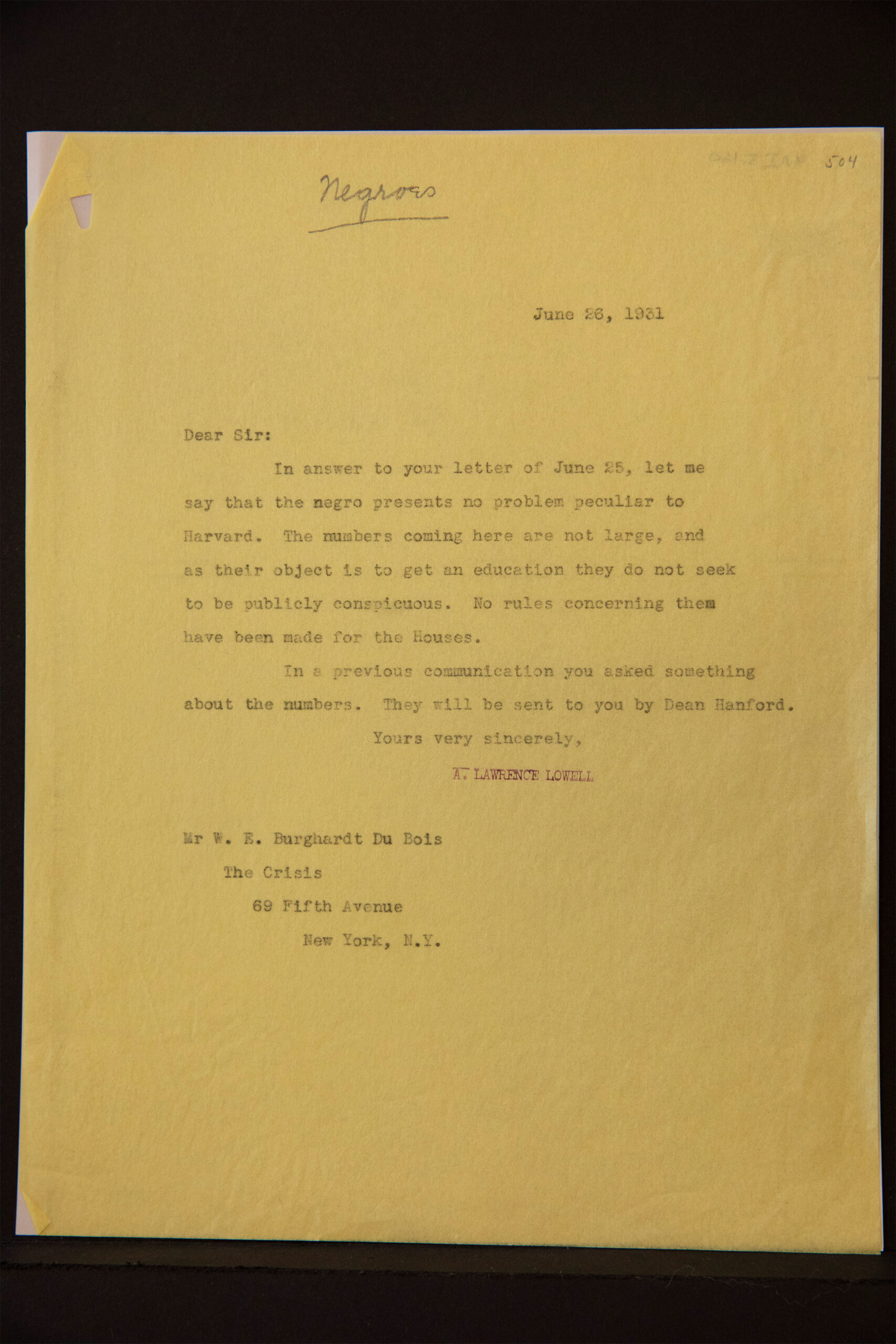
Editor of The Crisis, the NAACP’s influential journal, Du Bois sought statements from top college officials, including Harvard President A. Lawrence Lowell, on how African-American students were faring on campus now that their numbers had risen and Harvard’s House system had just launched with the opening of Dunster and Lowell in 1930. Du Bois boarded in a Cambridgeport home during College because he could not afford the Yard dormitories. Lowell’s terse reply seemed to evade Du Bois’ question.
GAZETTE: Was the election of Barack Obama, and the “post-racialism” that he appeared to embody early on in his presidency, the idyll that Du Bois longed for?
BOBO: I think Du Bois wanted a world where one could maintain a black cultural identity and affinity but not have a price tag attached to that, not have stigmatization and marginalization that would flow from that, that it would be an identity one could take off and put on as it was relevant. Obama in a way didn’t — I don’t think Obama himself ever projected that, and he never said that. From the beginning, he was engaged in a constant, almost 24-hour-a-day management of the racial divide, not in some sense to pretend we had transcended or overcome it, but to do that in a way, slowly, in its own incremental fashion, trying to keep things moving in a positive direction. But the forces of reaction against that were powerful, and with a kind of splintering of the left that, for a great variety of reasons, made it a vulnerable achievement.
GAZETTE: Less known about Du Bois is that he was the first sociologist to study what it means to be white, and he was among the first to champion a “black is beautiful” aesthetic. Can you talk about Du Bois’ ideas on racial identity, and how they fit into the current thinking?
BOBO: It’s interesting. He has sometimes been criticized as one of those who, for all the ways in which he rose above his times, was a product of it in “essentializing” race. He would argue that the black American is not trying to vanish. But almost certainly by virtue of the unique experience African-Americans have had, they have a unique contribution to make to humanity and to the advance of civilization. I suspect that even if he were sitting here today, he would say that.
Certainly, if you look at “Black Reconstruction” or “The Philadelphia Negro,” he’s arguing that African-Americans are fully human and essentially on par with any other group of human beings, and that anyone who is similarly situated, similarly resourced, and similarly treated is going to manifest the same outcomes and patterns that we see among African-Americans. In effect, he’s declaring this is not to be traced to biology or nature, but to historical relations as they’ve evolved in organizations of the economy, organizations of neighborhoods and communities, organizations of our legal and political system. I think that was his core sociological message.
This interview has been edited for length and clarity.



